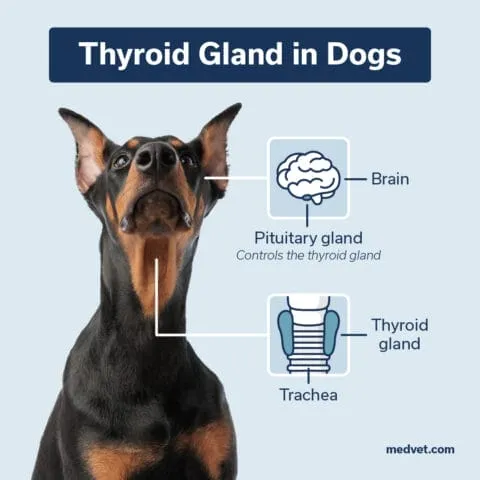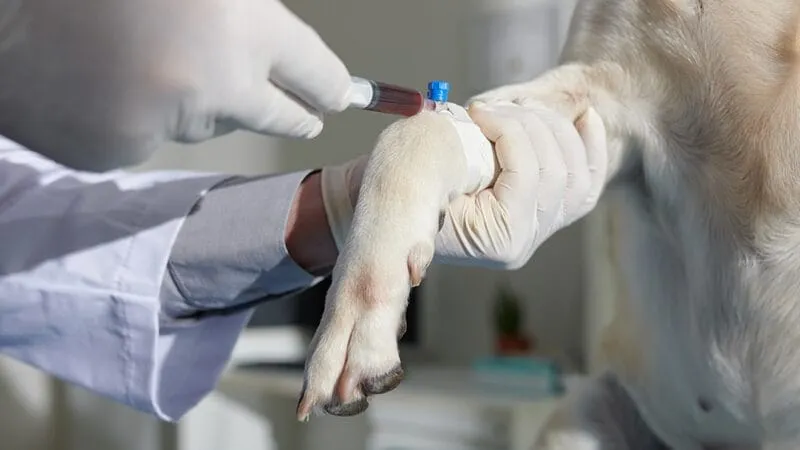The thyroid gland is a small yet mighty organ, crucial for regulating your dog’s metabolism, growth, and overall development. When a Dog Has Thyroid Problem, it can significantly impact their well-being, often going unnoticed until the condition is advanced. Understanding the intricacies of canine thyroid function, recognizing the subtle signs of dysfunction, and knowing the diagnostic and treatment options are essential for every responsible pet owner. This guide delves into the most common thyroid issue in dogs – hypothyroidism – to help you better manage your canine companion’s health.
Understanding the Thyroid Gland in Dogs
Located in the neck, on either side of the trachea (windpipe), the thyroid gland consists of two lobes. It operates under the guidance of the pituitary gland, situated at the base of the brain. The thyroid acts like the body’s internal thermostat, steadily releasing vital hormones, primarily thyroxine (T4) and triiodothyronine (T3), into the bloodstream. These hormones are responsible for regulating cellular energy utilization, impacting virtually every bodily function.
When this vital gland becomes diseased, it can disrupt your dog’s delicate metabolic balance. In the vast majority of cases where a dog has thyroid problem, the condition is hypothyroidism. This occurs when the thyroid gland doesn’t produce enough hormones, causing a widespread slowdown of metabolic processes. Hypothyroidism can progress silently, and by the time it’s diagnosed, a dog may have lost a significant portion (up to 75%) of their thyroid tissue. This highlights the importance of vigilance and regular veterinary check-ups. The thyroid’s influence on various bodily systems also means it can play a role in complex biological processes, including certain developmental conditions like dwarfism syndrome in dogs.
 Anatomy of the thyroid gland in dogs
Anatomy of the thyroid gland in dogs
Recognizing the Signs of Canine Hypothyroidism
The symptoms of hypothyroidism in dogs can be varied, often subtle, and may mimic other health issues, making diagnosis challenging. If you suspect your dog has thyroid problem, look out for these common indicators:
- Weight Gain: A noticeable increase in weight without a corresponding change in diet or exercise is a hallmark sign. Your dog might seem to gain weight effortlessly.
- Lethargy and Decreased Activity: Affected dogs often become unusually tired, sluggish, and reluctant to play or exercise. Their overall activity level drops significantly.
- Skin and Coat Problems: This is one of the most visible signs. Dogs with hypothyroidism frequently develop dry, flaky, or darkened skin. They may suffer from recurrent skin infections. Their coat quality deteriorates, becoming dull, brittle, and prone to excessive shedding. Hair loss, often symmetrical, typically occurs on the flanks, thighs, neck, and tail. Hair regrowth can be extremely slow or non-existent after clipping, and these manifestations can sometimes be mistaken for other common dermatological issues, even specific [skin disorders in German Shepherds], highlighting the importance of accurate diagnosis.
- Cold Intolerance: Due to a slowed metabolism, hypothyroid dogs have difficulty regulating their body temperature and may actively seek out warm places, showing discomfort in colder environments.
- Reproductive Issues: In female dogs, irregular or absent heat cycles can be observed, while males may exhibit decreased libido or infertility.
- Other Less Common Signs: These can include anemia (low red blood cell count), elevated blood cholesterol levels, neurological disturbances, and a slower-than-normal heart rate (bradycardia).
Causes Behind a Dog’s Thyroid Problem
While the exact cause isn’t always clear, two primary conditions account for most cases of canine hypothyroidism:
- Lymphocytic Thyroiditis: This is an autoimmune disorder where the dog’s own immune system mistakenly attacks and gradually destroys the thyroid gland tissue. Over time, enough tissue is damaged to lead to insufficient hormone production.
- Idiopathic Thyroid Gland Atrophy: In this condition, the thyroid tissue degenerates and is replaced by fat. The underlying reason for this atrophy is not yet fully understood.
Hypothyroidism is more prevalent in medium to large breed dogs and typically affects middle-aged individuals, usually between four and ten years of age. While any breed can be affected, certain breeds show a higher predisposition, including Beagles, Borzois, Boxers, Cocker Spaniels, Doberman Pinschers, Giant Schnauzers, Golden Retrievers, Irish Setters, and Rhodesian Ridgebacks.
Diagnosing Thyroid Problems in Dogs
If you suspect your dog has thyroid problem, a prompt visit to your veterinarian is crucial. Diagnosis involves a comprehensive approach combining clinical assessment with specific blood tests:
- Thorough History and Physical Examination: Your vet will discuss your dog’s symptoms, lifestyle, and medical history, followed by a detailed physical check-up.
- Blood Tests: These are essential for measuring hormone levels.
- Total T4 (TT4): Often a preliminary screening test. However, results can be influenced by other illnesses or medications your dog might be taking, so it’s not always definitive.
- Free T4 (FT4) by Equilibrium Dialysis: This test measures the active, unbound form of T4, providing a more accurate assessment and being less affected by non-thyroidal illnesses.
- Thyroid-Stimulating Hormone (TSH) Assay: TSH is released by the pituitary gland to stimulate the thyroid. In hypothyroid dogs, TSH levels are typically elevated as the pituitary gland works harder to try and stimulate an underperforming thyroid.
- T3 and T4 Autoantibody Tests: These tests help detect lymphocytic thyroiditis by identifying antibodies against thyroid hormones, confirming an autoimmune component.
While a low T4 level on a routine blood panel might raise a red flag, further specialized tests are often required to confirm a definitive diagnosis of hypothyroidism due to the various factors that can influence T4 levels.
Effective Treatment for Canine Hypothyroidism
When a dog has thyroid problem like hypothyroidism, treatment primarily involves lifelong hormone replacement therapy. The most common medication prescribed is FDA-approved levothyroxine, a synthetic form of thyroxine administered orally. The precise dosage and frequency are tailored to each individual dog’s needs and the severity of their condition.
Treatment is generally highly effective, but it requires regular monitoring. This includes periodic blood tests to ensure that optimal hormone levels are maintained and to adjust the medication dosage as necessary. Consistency in administering the medication is key to managing the condition successfully. For a deeper dive into the specifics of managing thyroid problems in dogs treatment, consulting your veterinarian is always recommended.
 Treatment of canine hypothyroidism for dogs
Treatment of canine hypothyroidism for dogs
Prognosis for Dogs with Hypothyroidism
The outlook for dogs diagnosed with hypothyroidism is overwhelmingly positive. With consistent and appropriate treatment, most dogs show a significant improvement in their symptoms and can go on to live full, normal lives. Regular follow-up appointments with your veterinarian are crucial for adjusting medication dosages, monitoring their overall health, and addressing any new concerns.
While hypothyroidism is not curable, it is a highly treatable condition. Early detection and intervention are paramount to effective management, ensuring that your beloved companion maintains an excellent quality of life. If you suspect your dog has thyroid problem, particularly any of the signs associated with hypothyroidism, don’t hesitate to consult your family veterinarian for an evaluation. In some cases, your vet may recommend a referral to a veterinary internal medicine specialist for a more thorough assessment and to devise the best long-term management strategy for your dog’s health.
